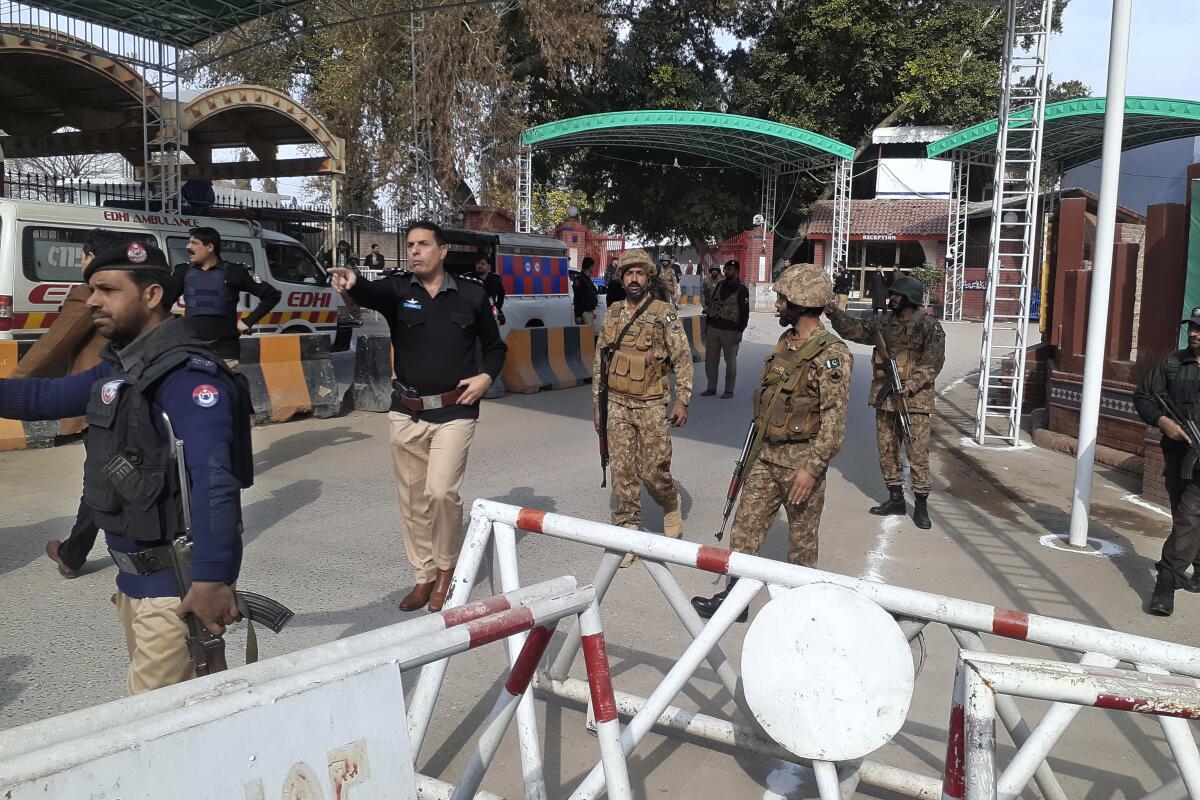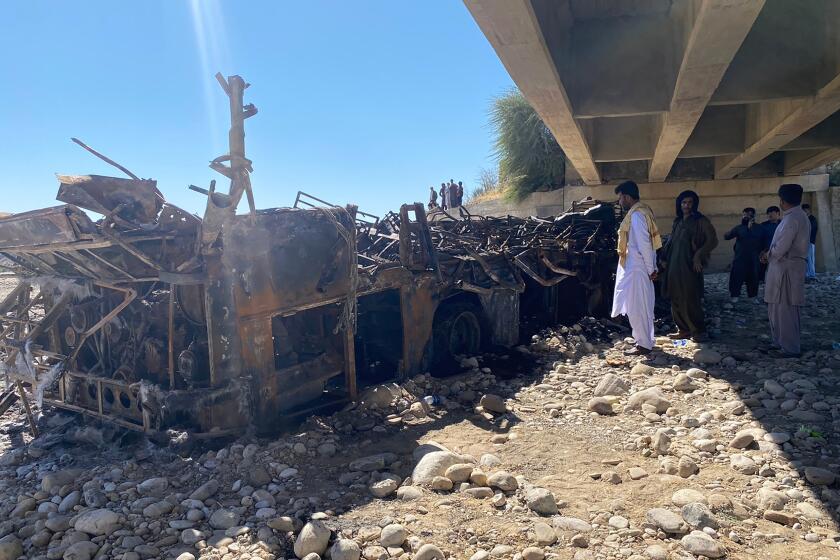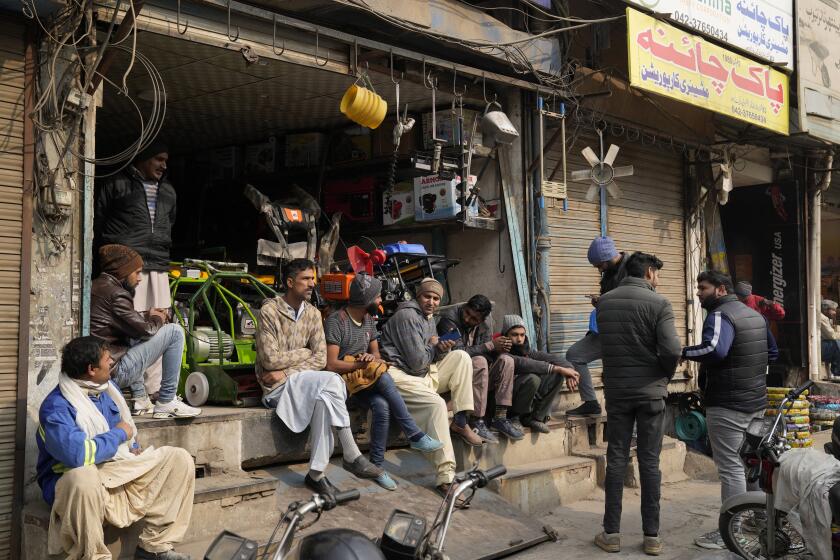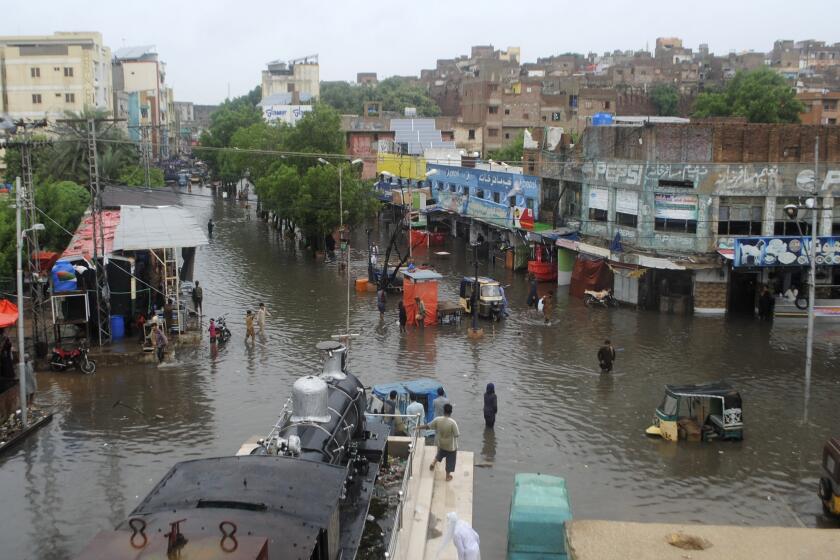Suicide bomber kills 59, wounds more than 150 at mosque in northwest Pakistan

- Share via
PESHAWAR, Pakistan — A suicide bomber struck a crowded mosque inside a police compound in Pakistan on Monday, causing the roof to collapse and killing at least 59 people and wounding more than 150 others, officials said.
Most of the casualties were police officers. It was not clear how the bomber was able to slip into the walled compound, which houses the northwestern city of Peshawar’s police headquarters and is itself inside a high-security zone with other government buildings.
Sarbakaf Mohmand, a commander for the Pakistani Taliban, also known as Tehreek-e-Taliban Pakistan, or TTP, claimed responsibility on Twitter for the attack.
But hours later, TTP spokesperson Mohammad Khurasani distanced the group from the bombing, saying it was not its policy to target mosques, seminaries and religious places, adding that those taking part in such acts could face punitive action under TTP’s policy. His statement did not address why a TTP commander had claimed responsibility for the bombing.
“The sheer scale of the human tragedy is unimaginable. This is no less than an attack on Pakistan,” tweeted Prime Minister Shahbaz Sharif, who visited the wounded in Peshawar and vowed “stern action” against those behind the bombing. He expressed his condolences to families of the victims, saying their pain ”cannot be described in words.”
Pakistan, which is mostly Sunni Muslim, has seen a surge in militant attacks since November, when the Pakistani Taliban ended its cease-fire with government forces.
Earlier this month, the Pakistani Taliban claimed one of its members shot and killed two intelligence officers, including the director of the counter-terrorism wing of the country’s military-based spy agency Inter-Services Intelligence. Security officials said Monday that the gunman was traced and killed in a shootout in the northwest near the Afghan border.
The TTP is separate from but a close ally of the Afghan Taliban. The Pakistan group has waged an insurgency over the last 15 years, fighting for stricter enforcement of Islamic laws, the release of members in government custody and a reduction of the Pakistani military presence in areas of Khyber Pakhtunkhwa province, which it has longed used as its base.
Monday’s assault was one of the deadliest attacks on security forces in recent years.
More than 300 worshipers were praying inside the mosque, with more approaching, when the bomber set off his explosives vest. Many were injured when the roof came down, according to Zafar Khan, a local police officer. Rescuers scrambled to remove mounds of debris from the mosque grounds to reach worshipers still trapped under the rubble.
A bus carrying 44 passengers crashes into a pillar and falls off a bridge, catching fire and killing 40 people in southern Pakistan on Sunday.
Meena Gul, who was inside the mosque when the bomb went off, said he doesn’t know how he survived unhurt. The 38-year-old police officer said he could hear cries and screams after the bomb exploded.
Mohammad Asim, a spokesman at the main government hospital in Peshawar, put the death toll at 59, with 157 others wounded. Police official Siddique Khan said the bomber blew himself up while among the worshipers.
Senior police and government officials attended the funerals of 30 police officers, and arrangements to bury the rest were being made. Coffins were wrapped in the Pakistani flag, and the officers’ bodies were later handed over to relatives for burial.
Peshawar, the capital of Khyber Pakhtunkhwa province, has been the scene of frequent militant attacks.
The power went out in much of Pakistan after an overnight energy-saving measure by the government led to a failure to reboot the grid after daybreak.
The Afghan Taliban seized power in neighboring Afghanistan in August 2021 as U.S. and NATO troops pulled out of the country after 20 years of war.
The Pakistani government’s truce with the TTP ended as the country was still contending with unprecedented flooding that killed 1,739 people, destroyed more than 2 million homes, and at one point submerged as much as a third of the country.
Afghanistan’s Foreign Ministry said in a statement that it was “saddened to learn that numerous people lost their lives and many others were injured by an explosion at a mosque in Peshawar” and condemned attacks on worshipers as contrary to the teachings of Islam.
Condemnations also came from the Saudi Embassy in Islamabad, as well as the U.S. Embassy, adding that “The United States stands with Pakistan in condemning all forms of terrorism.”
U.N. Secretary-General Antonio Guterres called the bombing “particularly abhorrent” for targeting a place of worship, U.N. spokesman Stephane Dujarric said.
Cash-strapped Pakistan faces a severe economic crisis and is seeking a crucial installment of $1.1 billion from the International Monetary Fund — part of its $6 billion bailout package — to avoid default. Talks with the IMF on reviving the bailout have stalled in the past months.
How you can help Pakistan after flooding devastates a third of the country.
Former Prime Minister Imran Khan called the bombing a “terrorist suicide attack” in a Twitter post. “It is imperative we improve our intelligence gathering & properly equip our police forces to combat the growing threat of terrorism,” Khan tweeted.
Sharif’s government came to power in April after Khan was ousted in a no-confidence vote in parliament. Khan has since campaigned for early elections, claiming his ouster was illegal and part of a plot backed by the U.S. Washington and Sharif have dismissed Khan’s claims.
More to Read
Sign up for Essential California
The most important California stories and recommendations in your inbox every morning.
You may occasionally receive promotional content from the Los Angeles Times.















